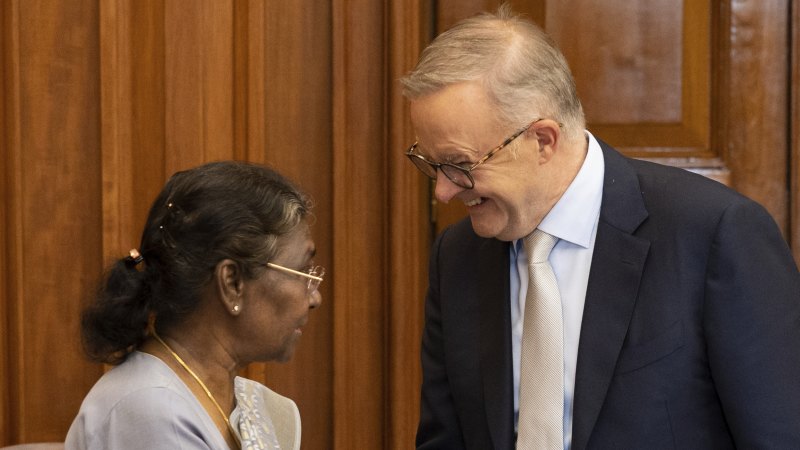Save articles for later
Add articles to your saved list and come back to them any time.
A single word on a dinner invitation has triggered a frenzy of conjecture that the name of the world’s most populous nation could change.
Earlier this week India’s President Droupadi Murmu was referred to as “President of Bharat” on an invitation to a state dinner for leaders attending the G20 summit in Delhi this weekend.
Prime Minister Anthony Albanese at a meeting with President of India Droupadi Murmu earlier this year. This week she was described as the “President of Bharat” on an invitation.Credit: Photo: Alex Ellinghausen
India’s raucous media, which has over 900 registered news channels, has since been in overdrive debating whether the use of the word Bharat on the invitation card signals an intention by the Indian government to rename the nation.
Sambit Patra, national spokesman of the ruling Bharatiya Janata Party, or BJP, stoked the controversy when he posted an image of an official card referencing the visit of “the Prime Minister of Bharat” Narendra Modi to Indonesia for the ASEAN Indo-Pacific Forum in Jakarta on Thursday.
There have been Indian media reports that the Modi government will use a special session of parliament following the G20 summit to make the name switch.
Bharat is an ancient Sanskrit word that has long been used interchangeably to describe India. Article 1 of the nation’s constitution underscores the status of the two names: “India, that is Bharat, shall be a union of states.” The word Bharat is also in India’s national anthem.
But on the subcontinent place names are politically loaded.
For decades Indian state governments have been renaming colonial-era cities. In 1995 Bombay, a name associated with the British Raj, became Mumbai. Since then, Madras has been changed to Chennai, Calcutta to Kolkata and Bangalore to Bengaluru.
More controversial, in a country with a large Muslim population, has been the renaming of cities established during by the Moguls, a Muslim dynasty that ruled much of the subcontinent between the 16th and 18th centuries. In 2018, the north Indian city of Allahabad, founded by Mughal emperor Akbar, was changed to the Sanskrit word Prayagraj, which officials claim was the original name.
There is a long history of violent conflict between Hindus and the minority Muslim community, which makes up around 14 per cent of India’s population.
Critics claim some name changes are erasing the country’s heritage and pandering to the Hindu majority.
But for many, the name India also has negative associations with the subcontinent’s colonial history.
On Tuesday, the former Indian cricket star Virender Sehwag, who has 23.4 million followers on X, posted that “India is a name given by the British & it has been long overdue to get our original name ‘Bharat’ back officially.” He called on cricket authorities to ensure that “our players have Bharat on our chest” at the world cup tournament in India in November.
Many disagree. Shashi Tharoor, a prominent member of parliament from the opposition Congress Party posted on social media: “I hope the government will not be so foolish as to completely dispense with ‘India’. We should continue to use both words rather than relinquish our claim to a name redolent of history, a name that is recognised around the world.”
Sitaram Yechury, a prominent politician who India’s Communist Party told the Press Trust of India “we just don’t know why they hate ‘India’ so much.”
Robin Jeffrey, a visiting research professor at the Institute of South Asian Studies in Singapore, said the word Bharat invoked the region’s distant past.
“Although not a perfect analogy, it’s a bit like the French stopping calling their country France and starting calling it Gaul,” he said.
The term Bharat has been championed by Hindu nationalist groups affiliated with the ruling BJP.
Jeffrey said there may a long-term goal to change the formally recognised name, and that the Modi government had astutely drawn global attention to the idea of India as Bharat by including the term on a G20-related document.
“I think it’s a way to soften up the world’s media and get people learning about Bharat,” he said. “It’s also a way of softening up India on this.”
Modi will host the G20 summit in Delhi at a vast conference centre newly built for the occasion – is named the “Bharat Mandapam.”
Most Viewed in World
From our partners
Source: Read Full Article

